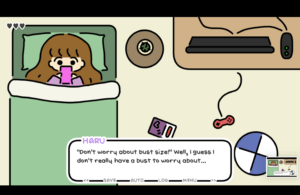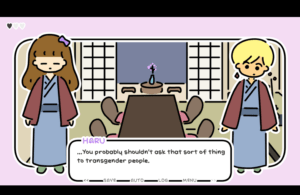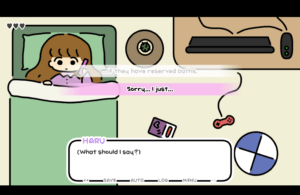I played “One Night, Hot Springs”, a visual novel about Haru, a young transgender woman in Japan who is going to the hot springs with her friends. This game was developed by npckc, and it is meant for all players who enjoy indie games, or want to learn more about the experience of a trans woman. I played this game on my Mac, and it can also be played on Androids, Microsoft Windows and Linux.
“One Night, Hot Springs” intertwines with feminist theories through the emotional affect that it achieves, as well as the agency that it gives to players. ONHS players play as Haru, a transgender woman who has to go to the hot springs for her best friend Manami’s birthday. Throughout the game, players experience Haru’s inner monologue, a powerful mechanic that helps players understand Haru’s perspective and insecurities. Through this mechanic, players increasingly understand and empathize with Haru’s identity, and to quote Chess’s words, “there is nothing more feminist than this”. At one point in the game, Haru searches the internet for how she should prepare herself for a trip to the hot springs, and finds results such as “don’t worry about bust size” or “don’t wear too much makeup” (Figure 1). As the player experiences Haru’s inner monologue when she reacts to her findings, they start to question their own real life experiences. Many people have never thought about how the results of their web searches can exclude trans people. The player feels sadness and empathy for Haru, becomes more aware of biases against trans people, and rethinks the design of everyday objects, a process that very much aligns with feminist ideals. In addition to Haru’s inner monologue, the player also interacts with other characters in the visual novel through Haru’s eyes, and experiences the discomfort that she feels firsthand. This is especially relevant when Haru has to disclose her legal name at the hotel reception, or explain to a friend why she feels uncomfortable going to the public hot spring (Figures 2 & 3). Through inner monologues and conversations with other characters, the game communicates feelings of empathy and discomfort to its audience. Therefore, the game relies on the two mechanics to achieve its emotional potential and help the player understand transgender identity, which makes it a good feminist game according to Chess.
ONHS also intertwines with feminist theories by giving agency to players at crucial points in the game. Throughout the game, players get to choose how to respond in certain uncomfortable scenarios (Figure 4). Rather than having the trans character be a passive voice in the game, ONHS gives Haru a voice and lets her make her own decisions, which aligns with the feminist need for active voices that can speak up against systems of power. The game places these decision-making moments at important moments in the story: Haru gets to make decisions about disclosing her legal name, talking about bisexuality, or going to the public baths. This strategic choice further elevates Haru’s sense of agency throughout the game. By choosing a main character who is trans, and giving her agency, ONHS elevates a voice that is usually marginalized in our society, and echoes feminist theories in doing so.
Therefore, to play this game as a feminist is to consider how this game fits into “gaming” as we know it, and reconsider the products of digital games as we continue to play. We need to compare this game to the popular games that come to mind whenever “gaming” is brought up. To that end, here are my discussion questions: How can we increase this game’s visibility, and widen the scope of “gaming” as we know it to be more inclusive of games such as “One Night, Hot Springs”? How can we encourage more marginalized voices to make games like this one? And most importantly, now that we have learned more about the trans experience and empathized with Haru, how can we continue our learning journey?

Figure 1: Haru looks up how she should
prepare for the hot springs trip, and is met
with answers that are not relevant to her
experience.

Figure 2: Haru is called by her legal name at the
hotel reception.

Figure 3: Erika asks Haru an inappropriate
question about her legal name.

Figure 4: The player has to make an important
decision about whether they want to go to the hot
springs or not.



